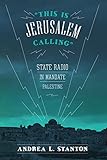This Is Jerusalem Calling : State Radio in Mandate Palestine / Andrea L. Stanton.
Material type: TextPublisher: Austin : University of Texas Press, [2021]Copyright date: ©2013Description: 1 online resource (270 p.)Content type:
TextPublisher: Austin : University of Texas Press, [2021]Copyright date: ©2013Description: 1 online resource (270 p.)Content type: - 9780292747500
- 384.54095694/09041 23
- HE8699.P32 S73 2013
- online - DeGruyter
| Item type | Current library | Call number | URL | Status | Notes | Barcode | |
|---|---|---|---|---|---|---|---|
 eBook
eBook
|
Biblioteca "Angelicum" Pont. Univ. S.Tommaso d'Aquino Nuvola online | online - DeGruyter (Browse shelf(Opens below)) | Online access | Not for loan (Accesso limitato) | Accesso per gli utenti autorizzati / Access for authorized users | (dgr)9780292747500 |
Frontmatter -- Contents -- Acknowledgments -- Introduction: Tuning in to Palestine’s Radio History -- 1. Selling Radio, Selling Radios: Advertising Sets in Mandate Palestine -- 2. Peasants into Palestinians: Rural and School Broadcasting -- 3. Broadcasting a Nationalist Modernity: The PBS Arabic Section -- 4. Putting Religion on the Radio -- 5. Claiming the PBS: Whose National Radio? -- Conclusion: The Multiple Afterlives of the PBS -- Timeline -- Notes -- Bibliography -- Index
restricted access online access with authorization star
http://purl.org/coar/access_right/c_16ec
Modeled after the BBC, the Palestine Broadcasting Service was launched in 1936 to serve as the national radio station of Mandate Palestine, playing a pivotal role in shaping the culture of the emerging middle class in the region. Despite its significance, the PBS has become nearly forgotten by scholars of twentieth-century Middle Eastern studies. Drawn extensively from British and Israeli archival sources, “This Is Jerusalem Calling” traces the compelling history of the PBS’s twelve years of operation, illuminating crucial aspects of a period when Jewish and Arab national movements simultaneously took form. Andrea L. Stanton describes the ways in which the mandate government used broadcasting to cater to varied audiences, including rural Arab listeners, in an attempt to promote a “modern” vision of Arab Palestine as an urbane, politically sophisticated region. In addition to programming designed for the education of the peasantry, religious broadcasting was created to appeal to all three main faith communities in Palestine, which ultimately may have had a disintegrating, separatist effect. Stanton’s research brings to light the manifestation of Britain’s attempts to prepare its mandate state for self-governance while supporting the aims of Zionists. While the PBS did not create the conflict between Arab Palestinians and Zionists, the service reflected, articulated, and magnified such tensions during an era when radio broadcasting was becoming a key communication tool for emerging national identities around the globe.
Mode of access: Internet via World Wide Web.
In English.
Description based on online resource; title from PDF title page (publisher's Web site, viewed 26. Apr 2022)


